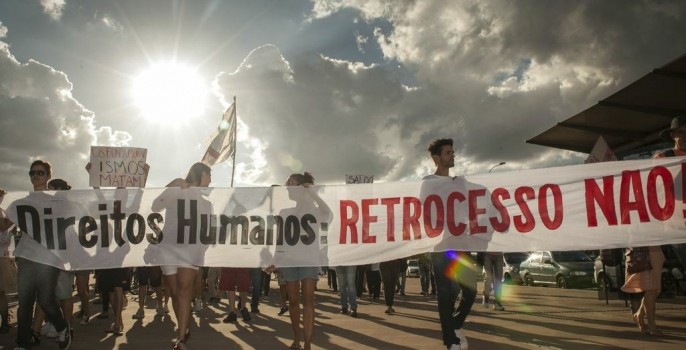It is Brazilian LGBTQI activists who are ahead of the pack so far in planning events for the International Day Against Homophobia & Transphobia 2013. And by a stretch. So far, actions have been announced in at least fifteen different towns and cities, far more than we here at the International IDAHO Committee team – at least – have heard of in any other country. And in general this year the pace of mobilisation is better than ever.
Partly this is no surprise. Brazil has a population of almost 200 million people and a strong history of lesbian, gay, bisexual, and trans* rights movements stretching back to the late 1970s. Brazil also has one of the highest rates of lethal violence against LGBT people in the world, and relatively strong social movements in general. But activists on the ground report that this year’s mobilisations also have to do with a recent backlash in Brazil, against human rights gains, led by traditional conservatives and the Evangelical right.
Most specifically, the appointment in March of far right Evangelical pastor, Marco Feliciano, to the head of Brazil’s Human Rights Commission, is being greeted with a massive wave of protests. Actions are being led by sexual rights activists, black rights activists and civil society groups in general, many of whom are deeply concerned with what, arguably, look like setbacks in the quality of democracy in contemporary Brazil.
To give the foreign observer an idea. Feliciano’s appointment is something like the cultural equivalent of appointing Fred Phelps or Rush Limbaugh to the head of – not the Ministry of Internal Affairs or the Foreign Office – but the Human Rights Commission. That is, the state body which is charged with developing equality and diversity policies, promoting participatory reforms, and guaranteeing government commitments to human rights in practice.
The Pastor has argued, amongst other things, that the ’curse’ facing African nations has a biblical basis: “The curse that Noah launched against his grandson, Canaan, spilled over the African continent, thus the hunger, the plagues, the diseases, the ethnic wars!”.
Elsewhere he has denied charges of homophobia, in the following manner: “I am not homophobic… I am against their promiscuity. I don’t want my daughters to go out on the streets and see men with shaved legs kissing each other. The Brazilian family must be respected.”
And, regarding John Lennon’s assassination (and his famous claim that the Beatles were ’bigger than Jesus’), Feliciano has said: “I would have liked to be there the day they discovered his body, I would have lifted the cloth which covered him and would have told him: Excuse me, John, but this first shot is in the name of the Father, this one is in the name of the Son and that one in the name of the Holy Spirit. Nobody confronts God and survives for debauchery.”
The situation isn’t being taken lightly by civil society groups. And the whole ’unhappy’ saga (widely dubbed ’Infeliciano’ affair) has also been serving to spotlight different issues about democratic quality in the country.
At discussions preceding Feliciano’s appointment on March 7, 2013, for example, protests were already happening at the Human Rights Commission. This was before the highly controversial decision to close the discussion sessions to guests, parliamentarians and the press only. Questions then emerged of how Congressional security guards treated protesters.
Since then, protests have multiplied around the country. In Bahia, activists sang the Brazilian national anthem at end of the March Against Feliciano at the State Commission of Human Rights and Minorities (CDHM). More than 600 people of all faiths gathered in Rio de Janeiro to express their opposition to what Feliciano represents, including faith leaders, artists, politicians and celebrities. Protests have even spreadinternationally.
Brazilian mobilisations in the month of May, then, may say just as much about the relative visibility of Brazilian LGBT activism in international arenas – such as the global May 17th commemorations – as they do about local struggles to take back ownership of Brazil’s human rights institutions.
Or perhaps Brazilian LGBTQI activists are just more organised than the rest of us?
Here are just a few of the events for May 17 we have heard of in Brazil so far:
Bahia – Various towns and cities. More than 50 organisations have joined forces to produce a month of events, across the state, for Bahia’s “May of LGBT Diversity”. Highlights include workshops, queer performances, LGBT parades, and the 1st Conference of Lesbian and Bisexual Women of the State of Bahia. The exhibition “Out Feliciano” will also run in Salvador, from May 3. Three different towns and cities in the state (Pojuca, Salvador and Vitória da Conquista) will hold events on May 17, including a special session on combating homophobia in the State Congress in Salvador. For more info see the blog of the Bahian LGBT Forum.
Mato Grosso do Sul – Campo Grande. “Conference on Sexual Diversity and the Criminalisation of Homo/Trans/Lesbophobia”. (May 23 – 24, 2013). LEVS/UFMS (Laboratório de Estudos de Violência e Sexualidade). Antiteatro do CCHS. Various academics will come together to promote debate on the secular state, human rights, and gender/sexuality theory in the current context of Marco Feliciano’s appointment to the CDHM. For more info see: http://diversidadesexualufms.blogsp…
Montes Claros, Minas Gerais. 10th Homoculture Show and 5th Conference: “Sertao Without Homophobia: Constructing Citizenship”. (May 13 – 17, 2013). Núcleo de Estudos Sobre Homocultura (Nehom), State University of Montes Claros. Workshops, roundtables, debates, academic presentations, mini-courses, exhibitions, cultural fair and cinema. For more info call (38) 3229 8178. Email nehom@unimontes.br. Log onto: http://www.nehom.unimontes.br
Pernambuco, Recife. May Against Homophobia. Press conference + launch (May 8); Meeting for LGBT families (May 9); Workshop and hip-hop street art in schools event – all with the theme of combating homophobia (May 17); Opening ceremony of the Instituto José Ricardo (May 21). For more info contact Eleonora Pereira – eleo2005@yahoo.com.br
Rio de Janeiro – Campos dos Goytacazes. Film showing of the documentary “Janaína: A Dama de Ferro” about the first travesti who became a lawyer in Brazil, with the filmmaker Vagner de Almeida (May 17, 20:00). Book launch of “Um Buquê Improvisado” by Roberto Muniz Dias. (Address: A Casa do Advogado, Praça Barão da Lagoa Dourada). For more info contact Margarida Estela Mendes do Nascimento – maresmendonas@yahoo.com.br
São Paulo – Santos. The city of Santos, like others in Brazil recognises May 17 as the Municipal Day of Combating Homophobia. OAB, IBDFAM e Prefeitura de Santos will come together in a panel discussion about anti-homophobic laws and the possibility of creating a new government LGBT Commission. There will also be a public hearing in the municipal Congress on the “Secular State and Sexual Diversity”. For more info email Patricia Gorisch – patricia@patriciagorisch.adv.br
If you require further English language information on these events or on May 17 mobilisations in Brazil for 2013, contact Toni Reis via tonireisctba@gmail.com or get in contact with the international IDAHO team at the usual address: contact@dayagainsthomophobia.org


